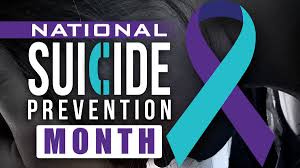A message from John Boyd, PsyD, Sutter Health’s CEO of Mental Health Services, during Suicide Prevention Awareness Month.
When I learned the news that I had lost someone to suicide, my first thought was, “I should have known.”
As a long-time mental health advocate and practitioner, I knew my response was the most common thought to cross the minds of those touched by suicide. I knew that family and friends repeatedly consider what difference it may have made had they known and intervened. I knew my years of education and training did not make me immune from this sense of responsibility and guilt.
It can often take a community to detect the warning signs that surface as pieces of a puzzle, appearing at different times and before different people. That people considering suicide are often afraid to speak up due to the stigma surrounding the mental health and addiction issues that most often lead to suicide. And while mental health issues are the most common reason for death by suicide, there are more hidden and less known reasons—financial problems, traumatic stress, relationship issues, the loss of family acceptance, academic failure and bullying.
This is why it’s so important that all of us learn as much as we can about the warning signs that lead to this irreversible outcome. National Suicide Prevention Awareness Month gives us all the opportunity to learn and share more.
We can all relate to struggling with despair and hardship. And there are specific signs that point to it all becoming too much for someone to bear—things like hopelessness about the future, sleep problems, withdrawal from friends or social activities, changes in personality or appearance, dangerous or self-harmful behavior, making preparations to put personal business in order, or threatening or talking about suicide. Mental health challenges are the leading factor, with 30% to 70% of suicide victims suffering from major depression or bipolar (manic-depressive) disorder, according to Mental Health America. The organization also notes that those with substance abuse disorders are six times more likely to complete suicide than those without.
Strikingly, this is an issue particularly common among healthcare workers who spend their days caring for others. Research cited by the Journal of the American Medical Association (JAMA) estimates that one doctor commits suicide each day. Physicians’ suicide risk is higher than any other profession due to higher rates of anxiety, depression and burnout. Yet, due to long-held stigmas, it is often more difficult for healthcare providers to reach out for support, notes the American Academy of Family Physicians (AAFP). Studies show that this risk is only increasing as providers care for themselves, their families and their patients during a global pandemic. At Sutter Health, we make our physicians’ and employees’ mental wellbeing a top priority, creating awareness, providing resources and reducing the stigma surrounding speaking up and asking for help.
Coming Together for Human Health
In what ways do we—as a community—address these alarming facts? It starts with understanding that mental health is human health. We are all human, deserving of compassion and grace. It starts by each and every one of us talking openly, sharing our experiences and listening to others to break through the stigma associated with mental health and addiction challenges.
In sharing our stories and experiences, we can reduce stigma. In opening our hearts and minds, we can heighten awareness. Most importantly, in coming together with care and compassion for one another, we can work together to recognize when someone needs us most.
Crisis Lifelines
If you or someone you know is in distress, please contact the National Suicide Prevention Lifeline at 1-800-273-8255. Or you can connect with a trained crisis counselor through the Crisis Text Line by texting 741741.





